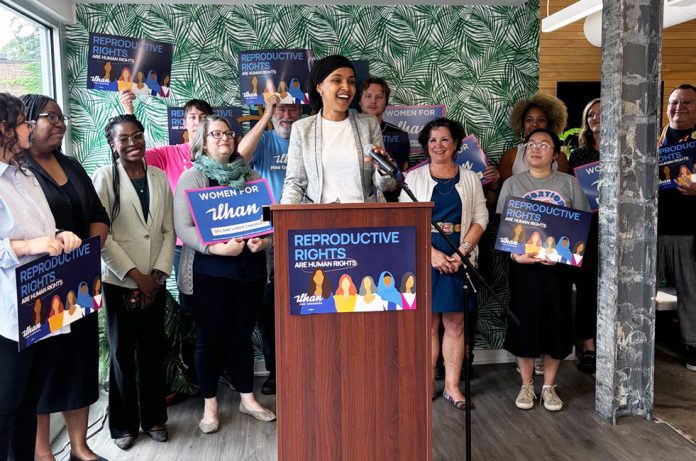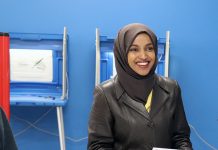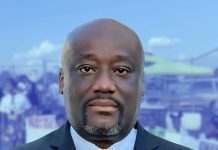

Rep. Ilhan Omar and several elected officials and activists held a press conference in Minneapolis Tuesday morning, calling on voters to make reproductive rights a major campaign issue in the upcoming general elections.
Omar urged voters to mobilize and elect pro-choice Democratic candidates in order to safeguard reproductive health care protections to women, both in Minnesota and nationwide. The press conference was held to mark two years since the U.S. Supreme Court overturned Roe v. Wade, a landmark ruling, which the same court made in 1973 to protect women’s right to abortion.
After nearly 50 years, the current Supreme Court overturned the law on June 24, 2022. Omar was among 17 congresspeople arrested in 2022 while protesting the ruling in a case known as Dobbs v. Jackson Women’s Health Organization, which stripped women across the United States of their constitutional right to receive abortions.
“When the Supreme Court chose to roll back the clock, I put my body on the line and stood in protest alongside my colleagues because the moment called for bold and direct action,” said Omar. “I put my body on the line because I could not accept living in a world where my daughters were going to grow up with fewer reproductive rights than my generation and the generations before have. Now more than ever, we have a clear directive to win a majority in both chambers of Congress in order to deliver equitable reproductive healthcare across the country.”
Ruth Richardson, a former state representative who now serves as the chief executive officer of Planned Parenthood North Central States, encouraged voters to expand their scope on the issue at hand.
“We know that there is so much that is on the ballot in November,” Richardson said. “We know that voting rights are on the line. We know that sexual and reproductive health care rights are on the line and that includes access to abortion care. That also includes contraception, and fertility treatments as well. And we also recognize that democracy is on the line.
Richardson said states with the most restrictive abortion laws have the highest rates of maternal mortality, the highest rates of infant mortality and that recently there has been a staggering increase in both domestic violence and intimate partner violence reports since the 2022 ruling.
The press conference took place at The Coven, the queer and gender-inclusive gathering space, and included personal testimonies — largely from women — about how abortion access had changed their lives for the better.
“I was not in a position to carry that pregnancy forward, and I was fortunate and privileged to live in a state and have a support network where I could navigate a complex system and find resources to access abortion,” said Alissa Light, a proponent of Minnesota Equal Rights Amendment, as she recounted the memory of undergoing an abortion two decades ago.
“I went into that clinic, and I have to say it felt like a sanctuary,” Light said. “It was right. I went into the rest and recovery room and my friend from South Dakota came out soon after. She sat down next to me, she put her hand on my hand and we just had a moment.”
The Minnesota Pro Act, which was passed in 2023, “codifies protections for all reproductive health care, including but not limited to: contraception, sterilization, preconception care, maternity care, abortion care, family planning and fertility services, and counseling regarding reproductive health care,” according to the state’s press release after Governor Tim Walz signed the bill into law. The Health and Human Services Omnibus Bill and the Reproductive Freedom Defense Act also provide protections for patients and providers.
Minnesota is among U.S. states with codified safeguards for women seeking abortion access and reproductive health care that have been taken away since the Dobbs decision, but local advocates say that the fight is far from over, calling attention to the need to decrease healthcare disparities among marginalized communities.
“Even here in Minnesota, Black women are three times more likely to die from pregnancy-related causes than white women,” said Esther Agbaje, a lawmaker who represents District 59B in the Minnesota State legislature. “And here in Minnesota, Black Minnesotans represent 13 percent of the birthing population but make up 23 percent of the pregnancy-associated deaths, and that is unacceptable, especially when the CDC estimates that more than 80 percent of pregnancy related deaths are preventable.”
With an emphasis on religious and cultural diversity at the forefront, Omar said remains steadfast in her championing for reproductive rights and abortion access.
“Our communities will never benefit by limiting choice,” said Omar. “I think whether you look at it religiously or not, it’s always important for the person, in whatever contracts they find themselves, to be able to have the ability to make that choice for them because a lot of the healthcare decisions are personal, and I think if we allow a few men of certain faith to make decisions about what we are allowed and what we are not allowed — what we are afforded and what we are not afforded — then I think that becomes a challenge for all of us.”
About Kwot Anwey
Kwot Anwey is a reporting intern with Mshale and majors in journalism at Boston University.








